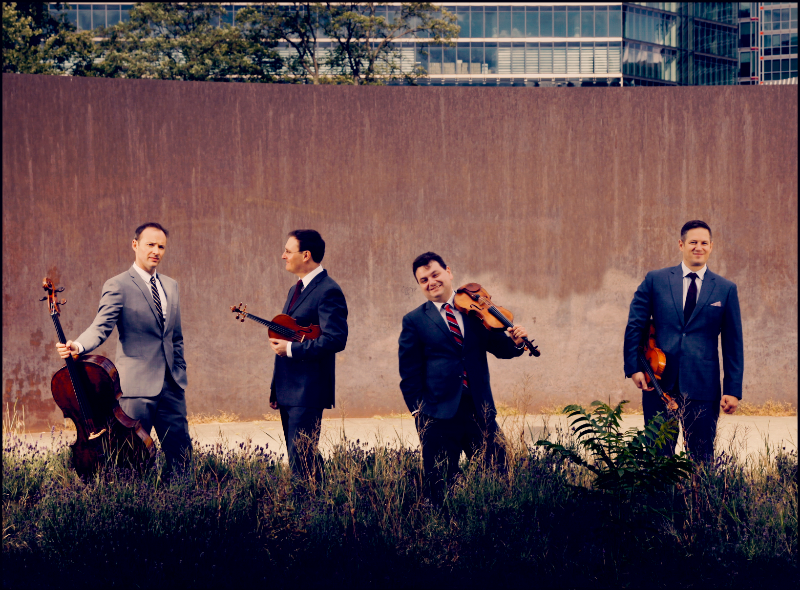by Daniel Hathaway

One of CCMS’s most frequently-invited ensembles, the Jerusalem Quartet has visited the series once a year since 2017, and once every other year from 2010 through 2015. In addition to Cleveland, the ensemble’s U.S. tours this season will include concerts in Houston, Durham, Baltimore, West Orange New Jersey, and New York, and a return to Boston’s Celebrity Series.
The Quartet’s program on October 22 begins with Mozart’s Quartet in d, K. 421, one of the set of six quartets the composer dedicated to his mentor, Joseph Haydn. For someone who normally composed rapidly and with little effort — Mozart’s sister noted that he often concocted whole pieces in his head while playing games, then sat down and simply wrote them out — these works inspired the composer to produce music at a level of perfection unusual even for him.
Second in the set of six, K. 421 shares its emotional climate with other Mozart pieces in d-minor (some examples are the Piano Concerto K. 466 and the Requiem), and except for its slow movement, remains in that somber key to the very end, resisting the conventional shift to the major version of the key.
Erich Wolfgang Korngold’s fascinating career began in Vienna and ended in Hollywood. A prodigy who had the good fortune — or the curse — of being the son of Vienna’s leading music critic, Korngold signed on as a composer with Universal Editions at the age of 11. His Second String Quartet, written in 1933, marked the effective conclusion of the European half of his creative life. Soon after its premiere, Korngold was wooed to America by the film director Max Reinhardt to arrange Mendelssohn’s incidental music for A Midsummer Night’s Dream.
One film project led to another, and by his death in 1957, Korngold’s name appeared along with Errol Flynn, Fredric March, Olivia de Haviland, and Bette Davis among the credits of Captain Blood (1935), Anthony Adverse (1936), The Adventures of Robin Hood (1938), The Sea Hawk (1940) and many others.
While no fan of the modernities of the Schoenberg school, Korngold infused his otherwise traditionally Romantic musical language with enough harmonic surprises that works like the E-flat Quartet enjoy a 20th-century patina on top of their chromaticism.
The Jerusalem will close their program with the ninth of Dmitri Shostakovich’s fifteen quartets, composed in 1964 when the Chamber Music Society was still a teenager. Its five movements are continuous — joined by held notes or motives that act as musical bridges — and somewhat palindromic, beginning with a Moderato and ending with an Allegro, its central scherzo surrounded by slow movements. Listeners can count on experiencing the composer’s signature range of emotional drama, including sarcasm and intentional vulgarity.
The Jerusalem Quartet first came together while still in high school. But at that time, according to violinist Alexander Pavlovsky in an interview before a prior Cleveland performance, becoming a world-class string quartet was the furthest thing from their minds. “We did not think a lot about the future. We were only concentrating on building a repertoire and enjoying every moment of being part of such an amazing ensemble.”
Because they were so young, Pavlovsky said they never thought that forming a quartet was risky. “We were chosen by the school and by our first teacher, Avi Abramovich, who gave us such a wonderful base. Our goal was to find the right balance between sounding like one 16-stringed instrument while preserving the individuality and personality of each member.”
When asked if he had any advice for young musicians who want to pursue a career in chamber music, he said it’s important to start playing it as early as possible. “It gives an additional perspective on the performing process and helps and enriches everyone, whether orchestra player or soloist. The most important thing is to learn how to listen to each other and react.”
Published on ClevelandClassical.com October 18, 2019.
Click here for a printable copy of this article


